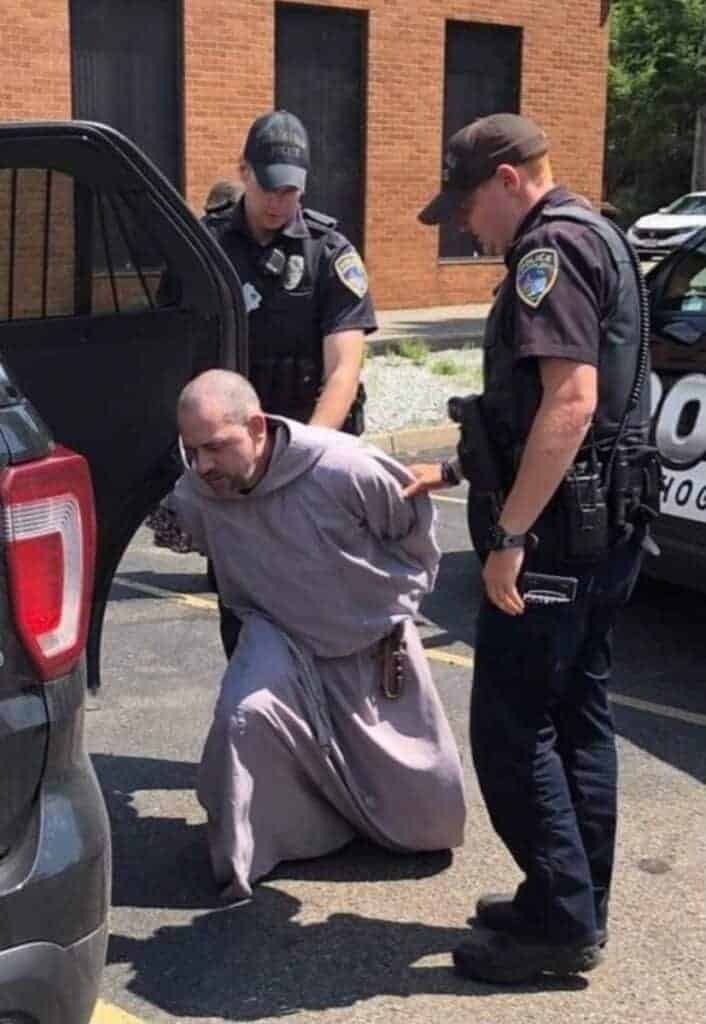
Father Christopher Moscinski was arrested outside a White Plains clinic in 2021
On Aug. 7, by a 13-3 vote, the Westchester County Board of Legislators repealed a portion of the Reproductive Health Care Facilities Act, passed by the BOL in 2022, and signed into law by County Executive George Latimer, after the US Supreme Court overturned Roe v Wade. Legislators removed requiring pro-life adocates to stay 8 feet away persons entering and leaving health care facilities in Westchester that offer abortion services.
Westchester resident Debra Vitagliano has sued Westchester County over the bubble zone, and her case in proceeding through the Federal Courts, possibly landing in the US Supreme court this fall. https://yonkerstimes.com/bol-considers-amending-reproductive-facilities-access-act-as-vitagliano-v-westchestercounty-heads-toward-us-supreme-court/
There was very little debate in the BOL chamber before the vote. County Legislator James Nolan asked for the vote to be tabled because he feared that it would add to the possibility of Westchester county getting sued over the law and the bubble zone provision. Nolan, and legislators Margaret Cunzio and Catherine Borgia voted no. Legislator Colin Smith said that the changes to the law were being made because of concerns about how the 8 foot zone would be enforced. Smith added that no enforcement efforts have been made to date.
Abortion rights group Planned Parenthood Hudson Peconic told News 12, “The bubble zone provision of the legislation was unenforceable, and therefore disrupts the integrity of the legislation’s overall ability to achieve its goal of protecting patients of reproductive health care facilities. Repealing the bubble zone provision will, in fact, strengthen the Reproductive Health Care Facilities Act by making the protections of the law more concrete and clearer for all people to understand.”
Pro-life advocates declared victory after the vote and claimed that the change to the bubble zone provision will not stop the case from proceeding, or protect the county from liability. The intent of the bubble zone provision was to protect women entering or leaving from pro-life counselors who wanted to discuss other alternatives.
The vote by the BOL follows a lawsuit by Thomas More Society on behalf of the national organization 40 Days for Life, a local vigil group, White Plains 40 Days for Life, and two individual pro-life sidewalk counselors.
“The bubble zone was unconstitutional the moment the board passed it,” said Christopher Ferrara, Thomas More Society Senior Counsel. “This is indeed a victory for free speech, and for pro-life advocacy. Those who seek to defend the right to life are constitutionally guaranteed the freedom to speak their mind, and shame on any governmental unit that attempts to curtail that freedom.”
He noted that the Dobbs decision, reversing Roe v. Wade last year, expressly criticized Hill v. Colorado—a prior United States Supreme Court decision that upheld a similar bubble zone. Since Hill was decided in 2000, the United States Supreme Court has implicitly recognized that “bubble zones” around abortion facilities are unconstitutional and casted doubt on the precedent set in Hill—even before the 2022 Dobbs called it a “distortion” of First Amendment law.
Also interesting was Legislator Catherine Borgia’s no vote, joining the Republican Nolan and Conservative Cunzio in voting no. Borgia authored the Reproductive Health Care Facilities Act.
The changes to the law will not impact the case making its way to the US Supreme Court. Joe Davis, from Becket, the law firm representing Vitagliano, said “We are happy to see an unjust law repealed, but it’s too late for having to answer for breaking the law.”
Other discussions about the Bill include whether or not legislators were advised by counsel about the legal issues with the Reproductive Health Care Facilities Act, and the bubble zone, and what if any impact that will have on future litigation.





